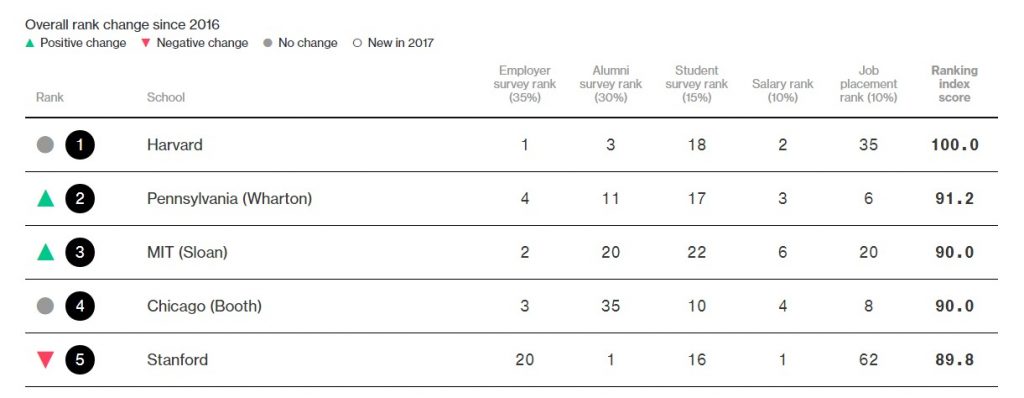Admissions Tip: The Waitlist

Last week was marked by Round 1 decision releases from a couple of the schools covered on MetroMBA and Clear Admit, and in the coming weeks, many of the remaining schools are scheduled to release R1 decisions. Clear Admit’s MBA LiveWire has captured a lot of this news, including quite a few candidates recently reporting that they’ve been waitlisted at places like London Business School and INSEAD.
For better or for worse, waitlisting is rather popular with top schools in the first round of admissions. As such, we’re devoting this week’s admissions tip to guidance for candidates who find themselves placed on a waitlist. Before we get to that, let’s look first at why schools use a waitlist.
Why Schools Use the Waitlist
First and foremost, while schools now know the quality of their Round 1 pool, they don’t yet know how strong the remainder of their applicants for this admissions season will prove, nor can they predict how many of the candidates admitted as part of Round 1 will ultimately enroll. Simply put, the waitlist helps schools manage these unknowns to arrive at the strongest possible class come fall. Some schools will “under admit” Round 1 candidates in case there is a flood of quality applicants in Round 2 or a higher yield of Round 1 candidates than predicted. The goal of the school is, after all, to admit the best overall class, regardless of when someone applies. They also do not want to over admit during an early round, which will limit their opportunities to admit strong candidates later, thus the push to “under admit,” and place significant quantities of candidates on the waitlist who may very well gain admission in later rounds. Chicago Booth explains this well on their web-site:
“The waitlist at Chicago Booth is used to gauge the pool of candidates in a subsequent round before offering a final decision to those candidates placed on the waitlist.”
Schools also can learn, by placing a candidate on the waitlist, how committed he or she is to attending the school. There is signal value in how a candidate responds to the waitlist decision. Some candidates placed on a waitlist receive offers at other schools they would prefer to attend, in which case they will opt out. Others remain convinced that the school that has waitlisted them is their best choice and will hold out to see if they can ultimately gain admission.
As well, if you are waitlisted, we’ve outlined some more advice we feel will help you on the way to earning an MBA.
Five Tips for Making the Best of the Waitlist
If you find yourself on the waitlist, don’t lose hope. Top programs admit a fair number of individuals from the waitlist in Round 2 and even later. That said, we know that cautious optimism does not make the wait for an answer any easier. To help those in this situation make sure that they’re doing all they can, we do have a few strategic waitlist tips:
Know—and follow—the rules.
Schools vary in their stances when it comes to interaction with those on the waitlist; some shun communication from applicants and even go so far as to discourage on-the-record campus visits, whereas others welcome correspondence and assign an admissions office liaison to serve the needs of waitlisted candidates.
We know that the natural impulse is to update the adcom that recent promotion or the final grade from that accounting class you took to bolster your academic profile. At first blush, a short letter or quick call to communicate this kind of update might seem harmless. But no matter how exciting the piece of news you want to share may be, ignoring the adcom’s instructions is ultimately going to reflect badly on you. Though policies discouraging communication from waitlisted candidates may seem frustrating or unfair, it’s important to respect and abide by the preferences of each school.
Communicate if you can.
For those programs that do permit or encourage contact from waitlisters—Booth, for example, has traditionally invited waitlisted candidates to submit an additional 300-word essay—it is important to provide an update. In addition to the obvious news items mentioned above, it’s beneficial to read over your essays and reflect on whether there is some piece of your background or interests that you haven’t gotten across yet. Taking the time to write about your relevant recent experiences, positive developments in your candidacy and ways that you’ve enhanced your understanding of the program is a nice sign of your interest in the school and a good strategy for telegraphing your commitment to attending. It is, of course, also in your interest to make sure that the adcom has the most up-to-date information so that it can make an informed decision the next time your file comes up for evaluation.
Keep in touch.
Don’t disappear after an initial note to the adcom or phone call to your waitlist manager (if applicable). If you have plans to be on or near campus, for instance, send a quick email to alert your waitlist manager (or whoever you may have interacted with on the adcom) to this fact. In many cases, you’ll find that the adcom will even invite you to stop by for a friendly chat about your candidacy—something that can go a long way towards helping your case. Beyond a visit, sending a brief update every few weeks or so is another way to reaffirm your interest in the school and keep you fresh in the minds of the adcom—something that could work to your advantage in a discussion of which candidates to admit from the waitlist. In all cases, it is important to remember that there is a fine line between persistence and pestering, so use good judgment!
Letters of support.
If, during the admissions process, you have interacted with students or alumni of the program, it may be worth reaching back out to these individuals and updating them on your status. Assuming you have made a positive impression during the admissions cycle, they may be willing to provide an additional letter of support for your candidacy at this stage of the process.
Have a contingency plan.
While it’s important to be consistent and enthusiastic when waitlisted and communicate with staff at your target program, it’s also wise to have a backup plan. With the Round 2 deadlines for several top programs a little over a month away, there’s still time to put together a solid application to another school. Even if you’re waitlisted at the school of your dreams and intend to reapply if not admitted, it’s also never too early to start thinking about the coming year and what steps you might take to enhance your candidacy before next fall.
Good luck to everyone waiting to receive decisions over the next few weeks!
This article has been edited and republished with permissions from Clear Admit.
Harvard Business School Tops Bloomberg Businessweek Ranking

For the third straight year, Harvard Business School reigned supreme in the annual Bloomberg Businessweek “Best Business Schools” ranking, topping the Wharton School at the University of Pennsylvania and MIT Sloan School of Management. In joining HBS on the medals podium this year, those schools both saw significant gains over last year, climbing from sixth and seventh respectively.
Rounding out the top five this year is the University of Chicago Booth School of Business —holding steady year over year at fourth—and Stanford Graduate School of Business, which fell from second place in 2016 to fifth this year.

The methodology Bloomberg Businessweek uses to arrive at its annual MBA ranking involves weighting each of five principle factors. Employer surveys account for 35 percent of a school’s score. Alumni surveys account for another 30 percent. And a combination of current student surveys, salary rankings, and job placement together account for the remaining 35 percent of the final score.
High Risers
Ten out of the top 20 ranked schools in the 2017 Bloomberg Businessweek ranking advanced at least one spot over last year. Wharton and Sloan each managed to leap four spots, boosted by high praise from employers and hefty salary benefits for recent graduates. The University of Washington Foster School of Business also managed to jump from 19th to 15th overall this year, thanks largely to its top ranking as the nation’s best business school for job placement.
The Cornell S.C. Johnson Graduate School of Management and the UCLA Anderson School of Management both saw a rankings jump of three spots, with Johnson moving up to 13th and Anderson coming in at 19th.
The year’s biggest winner, however, may be the Penn State Smeal College of Business, which jumped a whopping 12 spots from last year’s 37th to come in at 25th in 2017. It wins the award for the year’s biggest overall rankings increase. The USC Marshall School of Business also saw a momentous climb this year, sidling up eight spots from 38th last year to 30th this year.
In the latter half of the rankings came another one of this year’s biggest risers, with the Terry College of Business at the University of Georgia jumping 11 spots from last year, up from 65th overall to 54th. Elsewhere, the David Eccles School of Business at the University of Utah, the Whitman School of Management at Syracuse University, the C.T. Bauer College of Business at the University of Houston, and the Pepperdine University Graziadio School of Business and Management all saw a jump of at least seven spots in the new ranking.
Once Mighty, Now Fallen
Stanford GSB, Duke’s Fuqua School of Business, Dartmouth’s Tuck School of Business, and Jones School of Business at Rice University may all be feeling a wee bit dizzy. Last year Stanford shot up to second from seventh the year before, but this year it finds itself demoted to fifth. Duke’s Fuqua School, which last year celebrated a momentous jump from eighth to third, this year fell back down to seventh. Dartmouth’s Tuck School of Business, which had one of last year’s biggest gains, rocketing up nine spots to break into the top five from a mere 14th place finish the year before, this year finds itself at seventh. Similarly, Rice Business, as the Jones School likes to be called, which last year catapulted 11 spots to number eight, this year slipped to tenth. But at least all maintained their footing within the top 10.
Emory’s Goizueta Business School and the Texas A&M Mays Business School, for their part, slipped out of the top 20 altogether. Goizueta slipped just slightly, from 20th to 21st, and Mays slid from 18th to 22nd. The University of Virginia Darden School of Business also stumbled, slipping from 12th last year to 17th this year. But the Charlottesville school at least managed to remain in the top 20, thanks in part to strong scores in the student survey and salary categories.
No school, however, lost more ground than the George Washington University School of Business, which fell an eye-popping 14 spots from last year, losing its place among the top 50 business schools in the United States.
Bloomberg BW has made multiple changes to its methodology in recent years, resulting in significant volatility in terms of where schools fall on the list even when not much has changed year over year at the individual schools themselves. This has led many to question the credibility of the ranking overall. That said, Clear Admit’s Alex Brown found this year’s results easier to swallow than some in recent years. “This ranking seems more reasonable to me this year,” he says. “Each of the M7 programs are in the top 10, and the schools I would consider in the top 16 are all in the top 20.”
You can view the complete 2017 Bloomberg Businessweek rankings here.
This article has been edited and republished with permissions from Clear Admit.
Admissions Tip: Round 1 Rejection Reflections

Last week a number of programs, including Wharton, Michigan Ross, and MIT Sloan, sent out interview invites to their Round 1 candidates. These invitations came on the heels of similar updates from the likes of Harvard Business School and Chicago Booth. As a result, many candidates are now diligently preparing for interviews, having made it to the next phase of a competitive admissions process.
Rejected Without Interview
Of course, we recognize that not all applicants are so fortunate. And since we’ve published a great deal of content on interview prep of late, we’re turning the tables and dedicating this week’s admissions tip to those of you who haven’t moved forward.
The interview invite stage for Round 1 is the first signal as to your potential for attending a leading business school, and for a few, it can be a rude awakening.
If you have not yet received any good news, despite submitting applications in Round 1, you’ll want to read this post very carefully.
Reconfiguring Following Rejection
If there is any good news when it comes to being rejected in the first round, it’s that it’s still early in the application season, and not too late to readjust your strategy and target appropriate programs for Round 2. Round 2 application deadlines generally fall in the first couple of weeks of January, which leaves a little more than two months to prepare a new set of applications. It is also often the case, that your first applications are not the strongest. You learn through this process, and could potentially submit stronger applications for Round 2. Or it might be the case that you need to re-evaluate your goals, and then target a new set of programs that are appropriate for those goals. You could also adjust the competitiveness of the programs you target. So if you struck at all of your R1 targets, you may need to shift your target to slightly lower ranked programs.
Rejection Reflection
You also might want to take a hard look at what the schools which chose not to interview you, might have found lacking. If it’s your GMAT score, you have two months to try to remedy it. If you failed to make a compelling case for the degree or to properly showcase your experience in your essays, it might be a good time to get a fresh perspective from a third party on your materials. If your recommendations may have been lacking, speak with your writers or seek out new colleagues who might be able to better support your candidacy.
Of course, if there isn’t something as tangible as a poor test score, shoddy essays, or subpar letters of recommendation, you may need to take a longer view. For instance, if you lack professional experience, leadership accomplishments, or outside activities, it might make sense to delay your MBA ambitions, and reapply in a following year. Reapplicants are generally looked upon favourably in the admissions process.
MBA Motivations
Finally, you might want to reassess whether the MBA is the right next step for you. Perhaps the admissions committees are doing you a favor, and nudging you in a different direction.
Chin Up!
There’s no doubt that receiving negative results can be painful, but it’s how you handle the situation that will determine your future. Don’t lose site of the fact that news of rejection(s) is actually useful feedback in a process that can be quite opaque. Take the feedback to heart, regroup, reassess, and devise a plan to help you reach your goals.
This article has been edited and republished with permissions from Clear Admit.
Careers After School: Chicago Booth

At the University of Chicago Booth School of Business, 90.7 percent of 2016 MBA students had a job offer at graduation; 98.4 percent had a job offer by three months post graduation. And it’s no surprise. Not only is the Booth School ranked as one of the top names in MBA education by Bloomberg, U.S News, Financial Times, and The Economist, but as a university, it places a high emphasis on career services. Continue reading…
Top 5 MBA Interview Questions

Interviews, interviews, interviews … it’s all anyone seems to be talking about these days, and with good reason. Harvard Business School, Michigan Ross and Chicago Booth have already sent out their Round 1 interview invitations. Stanford GSB starts rolling out invites this week and UPenn/Wharton is also scheduled to release all its invites this week.
Instead of driving yourself crazy with worry, why not buckle down and perfect your answers to the questions you are most likely to be asked? To help you prepare, we’ve scoured the Clear Admit Interview Guides and Interview Archive to compile our very own Top Five MBA Interview Questions list of the questions that most often make their way into MBA admissions interviews at leading schools.
While these refer primarily to questions asked as part of blind interviews, they can certainly also come up as part of non-blind interviews. In those cases, you’ll want to be prepared to go deeper into some of the specific experiences you shared in your application (check out Clear Admit’s quick refresher on the difference between blind and non-blind interviews).
For detailed insights into each school’s interview process, the questions they ask, and how to tackle those questions, access Clear Admit’s Interview Guides.
Top Five MBA Interview Questions
Walk me through your résumé.
The real trick with answering this open-ended question is to gauge how much detail is too much. Imposing a structure can help. “It’s best to err on the side of brevity,” says Alex Brown, who asked this very question of many hopeful Wharton applicants during his time working in admissions at the Philadelphia school. “Think of this résumé walk-through as simply laying the groundwork for deeper discussion of your background and accomplishments.” A good idea is to develop a two- to three-minute run-through, beginning with where you grew up and went to college, what you studied and perhaps something you enjoy outside of work. Then move into a concise overview of your work experience, beginning with your first job and continuing to present day, making sure to explain why you made the choices you did and what you learned in each major role. “This kind of high-level overview gives your interviewer the perfect opportunity to ask for more detail about specific points if she wants it,” Brown says. If you have a gap of three or more months due to unemployment or some other cause, you should be prepared to address it, Brown warns, although in a short résumé question as part of the interview, it may not come up.
What are your career goals?
With any luck, you will already have a well-honed response to this question, developed and refined as part of the process of writing your application essays. “If you are looking to shift industry or function, this is your chance to explain your reasoning and that you have carefully thought through what may be involved in successfully making the transition,” Brown says. Keep in mind why the adcom is asking this question, Brown suggests. “They want to know how focused you are on the MBA and whether you are in a position to take advantage of the resources business school offers or at risk of getting overwhelmed,” he says. Present a very clear post-MBA goal, Brown recommends. “Schools prefer to admit students who can explain exactly what kind of job they want to pursue beyond graduation and articulate how it will set them up to obtain their long-term career objectives,” he says. Schools are also looking, with this question, to see if your goals make sense and are feasible in light of your past experiences; are you able to articulate a clear path and plan?
Why X school?
Here, schools want to see if you have really done your research on their program and whether you are a good fit with their culture. So, do your research. “I recommend a three-pronged approach to make a truly compelling case for your interest in a given school,” Brown says. Start with academics, he says, naming specific courses and professors that you are interested in. “Remember, your interviewer wants to see that you have really researched the school.” Second, mention specific clubs, conferences and other special programs that will help position you for your career goals. “Even better, show how you would contribute to the school community, such as by organizing an event to share specific knowledge you bring with your future classmates,” Brown suggests. Third, show that you have a good understanding of the school’s community, culture, class size and location and have thought about how these fit with your personality, goals and background. “If you have visited campus or talked with current students or alumni—definitely say so, lead with this.” Brown stresses. “Beyond showing that you’ve invested time in getting to know the school, this also helps your interviewer have a mental picture of you on campus.” he says.
Give us an example of a time you took a leadership role.
The way interviewers ask this question can vary—sometimes you’ll be asked directly about your most notable leadership experience and other times you’ll be invited to describe your general leadership style. “It’s important to keep a few basic principles about leadership in mind,” Brown says. “A leader is someone who has a strong vision or point of view and is able to see things others are not,” he continues. A leader must also have excellent communication skills. Choose an example that demonstrates these points. An ideal leadership example will describe a time when you negotiated with and persuaded key stakeholders, such as clients or a supervisor, to buy into your vision and then delegated the work and managed colleagues or juniors. “If you encountered obstacles along the way, share how you dealt with them,” Brown says. “If possible, you should also show success through quantified results,” he adds. As important as a successful outcome is demonstrating how you drew on the help of others where necessary. “No one is successful on their own,” Brown says. Show that you understand that strong leadership means teamwork and playing well with others, he says.
Tell us about a time you failed.
As tempting as it may be to say that you’ve never failed at anything…that is not what that adcom is looking for here. “In fact, this is a favorite question for those who appear to be ‘rock stars’ on paper,” Brown says. But rock stars make mistakes, and having an example in your back pocket of a time things did not go according to plan can show humility as well as your capacity to learn and grow. “The best answer to this type of question ends with a more recent experience where you took the lesson you learned from the failure and put it into play, affecting a better outcome.” he says.
These five questions certainly don’t cover everything your interviewer is likely to ask you, but they do touch upon some of the things you’re most likely to be called upon to share as part of your MBA admissions interview. You can take some of the anxiety out of the interview process by giving each one some thought, drawing on some relevant experiences from your past, and practicing the responses you would give. Don’t practice too much so that you appear overly rehearsed—since it’s important to seem both authentic and genuine—but prepare enough so that you’ll be ready to truly put your best self forward.
This article has been republished with permissions from Clear Admit.
Harvard, Stanford Earn Most Annual Business School Applicants

There are so many factors to consider when applying for an MBA program, it can often be overwhelming. Between cost, admissions requirements, location and program quality, narrowing down a select few to focus on for the application process is a challenge within itself. Nonetheless, between the time required to complete an application and the expense of application fees, it’s simply impossible to apply to every program you find interesting. Narrowing your focus to only your top choice schools can save time, money and a load of heartache.
While factors such as those mentioned above, like cost and location, are great ways to help narrow down your options, it is also helpful to take into consideration the competitiveness of each program. For many high-regarded MBA programs, the applicant pool can be so large that only a very small minority of applicants are accepted each year. While it may seem encouraged to “shoot for the stars,” understanding the real probability of your admission to a program can be a crucial factor in deciding whether or not to apply.
Thankfully, the U.S. News Short List, which focuses on particular data points from schools and degree programs around the country, recently compiled a list of MBA programs with the most applicants. As expected, these include some of the top programs in the country all ten programs with the highest applicant numbers were also included among the top 20 schools in the U.S. News 2017 Best Business School Rankings, and eight of them in the top ten.
While these are some of the top programs in the country, more applicants also means more rejections. All ten of these schools have acceptance rates lower than 25 percent, which means the majority of applicants are rejected. For many of these schools, the numbers are staggering. Of the 129 schools ranked this year by U.S. News, the average applicant number was 917. At Harvard Business School, which tops the list of largest applicant pool and the publication’s top-ranked business school in the country, there were 9,686 applicants for the fall of 2015.
Following HBS with the second most business school applicants is the Stanford Graduate School of Business with 7,899 applicants in the fall of 2015 and an acceptance rate of just 6.1 percent. The University of Pennsylvania (Wharton) placed third with 6,590 applicants and a 19.8 percent acceptance rate. Columbia Business School, ranked tenth best business school by the publication, received 5,829 applicants in the fall of 2015 and accepted just 18 percent of its applicants.
Also among the schools with the largest applicant pools were:
- Northwestern University (Kellogg): 4,300 applicants, 5th (tie) in ranking, 20.6 percent acceptance rate
- University of Chicago (Booth): 4,284 applicants, 2nd (tie) ranking, 24.4 percent acceptance rate
- Massachusetts Institute of Technology (Sloan): 4,254 applicants, 5th (tie) ranking 14.6 percent acceptance rate
- New York University (Stern): 3,696 applicants, 20th in ranking, 20 percent acceptance rate
- University of California—Los Angeles (Anderson): 3,533 applicants, 15th in ranking, 19.8 percent acceptance rate
- University of California—Berkeley (Haas): 3,506 applicants, 7th in ranking, 13 percent acceptance rate
Certainly, if you have an extensive resume and strong GRE scores, among other factors, there’s no reason why you shouldn’t be part of the small percentage of accepted applicants to these schools. However, full awareness of the probability of acceptance and competitiveness of each program can be important in narrowing down the schools you choose to apply to. Although these are schools with the largest pools, tracking down information about acceptance rate is a great idea for any program you are considering. For example—the Muma College of Business at the University of South Florida, which had the fewest applicants in 2015, had a 100 percent acceptance rate. If your goal is to save as much time and money as possible as you begin your degree, focusing on schools with high acceptance rates such as this can only make this already complicated process that much simpler.
